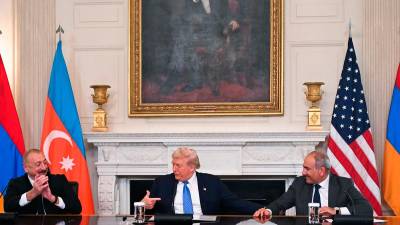MOSCOW: Russia cautiously welcomed a US-brokered draft peace deal between Armenia and Azerbaijan.
The agreement, signed in Washington on Friday, aims to end decades of conflict between the two former Soviet republics.
A key provision includes establishing a transit corridor through Armenia to link Azerbaijan with its exclave of Nakhchivan.
The corridor, dubbed the “Trump Route for International Peace and Prosperity,“ grants the US development rights in the strategic region.
However, Iran, a regional ally of Russia, strongly rejected the proposed corridor along its border.
Akbar Velayati, advisor to Iran’s supreme leader, warned the corridor would endanger South Caucasus security.
He called the plan “an impossible notion” and vowed it would become “a graveyard for Trump’s mercenaries.”
Russia, while acknowledging the deal, said it would further analyze the corridor clause.
Russian foreign ministry spokeswoman Maria Zakharova noted existing trilateral agreements between Russia, Armenia, and Azerbaijan.
She also highlighted that Russian border guards currently secure Armenia’s border with Iran.
Moscow maintains a military base in Armenia but has not intervened in recent conflicts due to its Ukraine war.
This has strained Russia’s historically strong ties with Armenia, pushing Yerevan closer to the West.
Armenia and Azerbaijan have fought two wars over border disputes and ethnic enclaves.
Russia, once the dominant power broker in the Caucasus, is now preoccupied with its Ukraine offensive.
Both Armenia and Azerbaijan praised US mediation efforts in resolving their conflict.
Azerbaijani President Ilham Aliyev even endorsed Donald Trump for the Nobel Peace Prize.
NATO welcomed the deal as a “significant step forward,“ but Russia refrained from calling it a formal agreement.
Zakharova referred to it only as “the meeting of the leaders of the South Caucasus republics in Washington.”
Analysts cautioned that the deal leaves many questions unanswered.
The International Crisis Group noted unresolved issues, particularly regarding the disputed Karabakh region.
Azerbaijan recaptured Karabakh in 2023, displacing over 100,000 ethnic Armenians.
A March agreement between the two nations formed the basis of the latest deal.
Analyst Joshua Kucera suggested the White House repackaged the March deal to involve Trump.
Azerbaijan later added demands, including constitutional changes in Armenia, before signing.
Armenian Prime Minister Nikol Pashinyan plans a 2027 referendum on constitutional amendments.
Kucera warned unresolved issues could still derail the peace process.
He called the corridor a potential breakthrough but noted missing details as major obstacles.
Independent analyst Olesya Vardanyan said the deal reflects Russia’s declining regional influence.
She attributed this shift to Moscow’s focus on Ukraine, diverting resources from traditional interests.
Despite uncertainties, Vardanyan said the deal offers Armenians hope for a better future. – AFP
